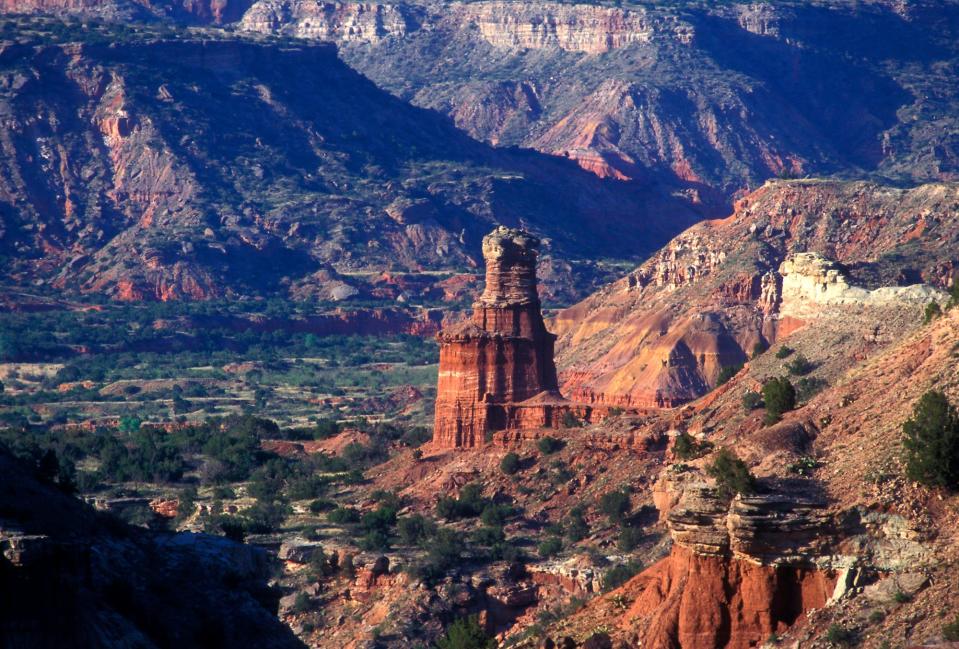Texans will vote on $1 billion state parks fund following Legislature approval
Voters will decide in November whether to authorize the Texas Parks and Wildlife Department to create additional trails, fishing holes and campsites in Texas, after the Legislature cleared the way to establish a $1 billion trust fund to acquire private land to develop into parks.
House members this week voted to authorize the election. On Monday, members passed Senate Joint Resolution 74 by a 123-21 vote — comfortably clearing the 100 votes required to pass a constitutional amendment. They followed Tuesday with a 120-19 vote in favor of the proposal's enabling legislation, Senate Bill 1648.
The Senate passed both measures in April, and, since the governor cannot veto a proposed constitutional amendment, the fate of this massive parks investment lies squarely in the hands of the state’s 17 million registered voters.
“We are grateful that our legislature and state leadership recognize the value of state parks and expanding outdoor recreation opportunities for the fast-growing population of Texans,” said Texas Parks and Wildlife Department executive director David Yoskowitz. “It is fitting that at a time when we celebrate and reflect on 100 years of Texas State Parks, we look to preserving our storied natural spaces for future generations.”
The proposed fund comes at an opportune time for outdoor enthusiasts, who are eyeing the state’s $33 billion budget surplus to deliver a historic gift to the Texas Parks and Wildlife Department on its 100th anniversary. Parks supporters are sounding alarms that without a bold investment, Texas, which ranks 35th in the nation in state parks acreage per person, will run out of space to open parks for the state’s rapidly growing population.
The proposal is the work of a bipartisan Senate coalition, with the author, Sen. Tan Parker, R-Flower Mound, receiving support from Democratic co-authors Sens. César Blanco of El Paso, Sarah Eckhardt of Austin and José Menéndez of San Antonio. Joining them as a co-author is Sen. Lois Kolkhorst, R-Brenham. In the House, Rep. Armando Walle, D-Houston, carried a companion bill.
“This is an opportunity for a new golden age of park acquisition for the state of Texas, and we think that would be a perfect birthday present for the park’s centennial,” Luke Metzger, executive director of Environment Texas, said at a Senate committee hearing in April.
The previous golden age — the 1980s — represented unprecedented growth in the state parks system. Over 30 parks and natural areas opened during this time, including popular hiking and camping destinations such as Big Bend Ranch, Seminole Canyon and Enchanted Rock. Stimulating the park boom was $75 million raised through a bond the Legislature approved in 1967. That money ran out in the late 1990s, and, without an alternative funding stream, the parks system has gone year after year without significant growth.
Later this year, the state will open its first new state park in north Texas in 25 years. Palo Pinto Mountains State Park, a 4,871-acre parcel about 75 miles west of Dallas, is opening through a public-private partnership after reaching a $9 million fundraising goal.

In November 2019, Texans approved Proposition 5, which directs sporting goods sales tax to the Parks and Wildlife Department and the Texas Historical Commission. But that tax leaves only $7 million a year to acquire and develop new parks after it pays to maintain and operate existing parks, according to Parker, the senator who authored the latest parks proposal.
This November, Texans will be asked to establish the Centennial Parks Conservation Fund. It would consist of a one-time transfer of $1 billion, which will grow with interest. It can be used only to create parkland, and not on employee salaries or for maintenance and operations costs.
Texas is one of 12 states without a dedicated parks conservation fund, said Laurie Olson of the Texas Land Trust Council. She said that only 5% of the state's land is public.
If polling is a guide, Texans are likely to support the fund. Texas 2036, a think tank focused on preparing the state for future growth, says that nearly three-fourths of respondents to a recent survey supported investing $1 billion for parkland acquisition. The nonprofit predicts that by 2036 — Texas’ 200th birthday — the state will have added 8 million residents. That represents about one-fourth of the 30 million people living here now. Those new Texans will look to get outdoors and enjoy state parks, which parks advocates say already are overwhelmed with reservation requests during peak times.
Craig Nazor, of the Lone Star Chapter of the Sierra Club, said the time to buy land is now.
"It's not getting any cheaper," Nazor said at the Senate committee hearing.
This article originally appeared on Austin American-Statesman: Texans to vote on $1 billion state parks fund following Lege approval

